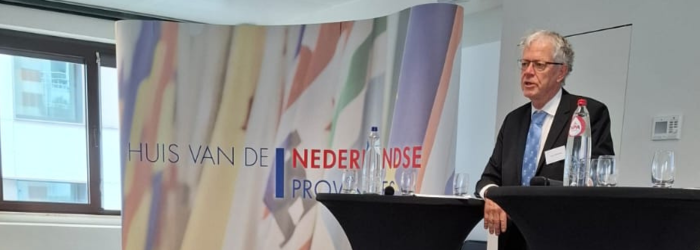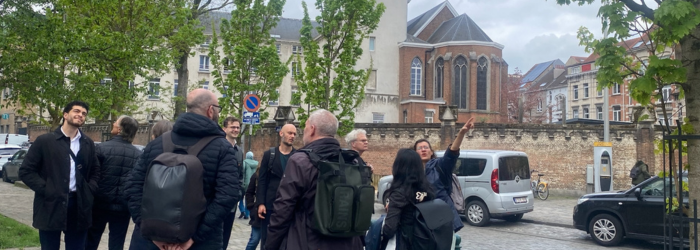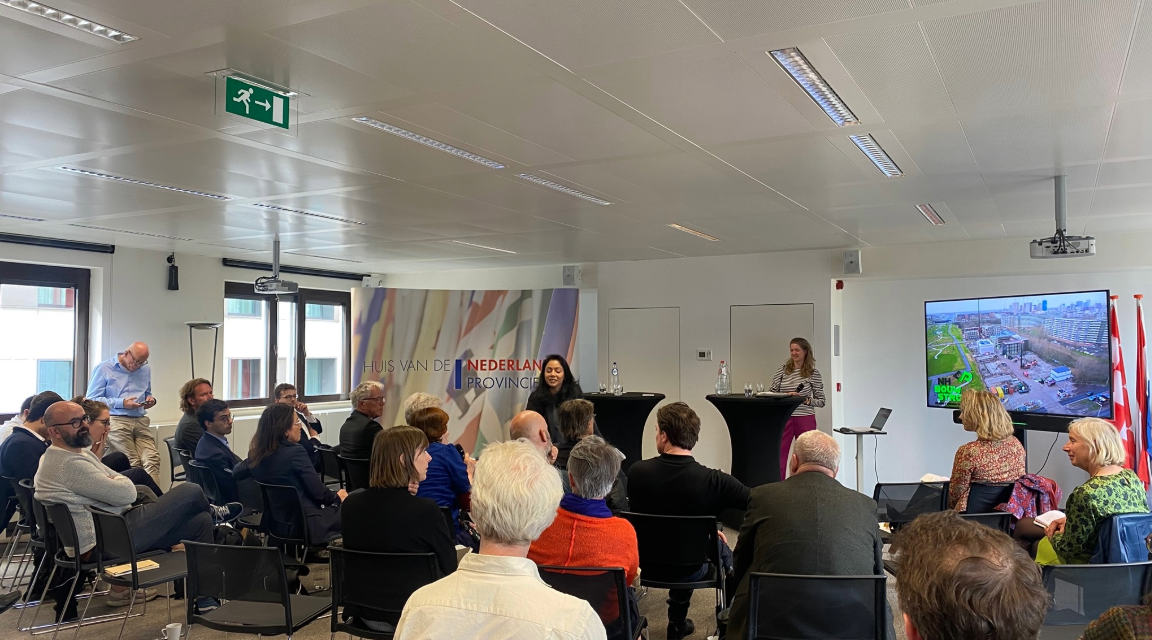IFHP x VDM Brussels convening
Reporting back
31 juli 2025
Europe is facing a housing crisis of unprecedented scale, one that demands not only more homes, but smarter, fairer, and more sustainable solutions. In response, the Deltametropolis Association (VDM) and the International Federation for Housing and Planning (IFHP) brought together key voices from across Europe in Brussels for a day of reflection, learning, and agenda-setting. With input from the European Commission’s Housing Task Force and a diverse group of experts, the convening explored how planning, design, governance, and finance can come together to shape a new housing future for Europe.
The Brussels Convening, jointly hosted by the Deltametropolis Association (VDM) and the International Federation for Housing and Planning (IFHP), brought together a remarkable mix of planners, policymakers, researchers, housing advocates, and designers to reflect on Europe’s deepening housing crisis. A key moment was the participation of Tatiana Marquez Uriarte and Lucía Caudet from the European Commission’s newly established Housing Task Force. Their presence, just two months after the task force’s launch, offered invaluable insight into the EU’s evolving approach to housing.
Uriarte and Caudet described the task force’s one-year roadmap: collecting evidence, launching consultations, and exploring policy tools to shape a future European Affordable Housing Plan. Their message to participants was clear: be specific. The more tangible the barriers, needs and recommendations, the better European instruments can respond to local realities.
The Brussels Convening brought together leading voices from across Europe to confront the housing crisis head-on, with the EU’s Housing Task Force calling for concrete input to shape a future where affordability, quality, and sustainability are built into the fabric of our cities.
The day opened at Perspective brussels, where Alfredo Corbalan and Yves van de Casteele set the stage with a compelling overview of Brussels spatial and demographic challenges. As a socially diverse yet administratively fragmented city, Brussels faces an acute housing shortage. Rising demand meets limited supply, especially in the affordable segment. Despite policy efforts like the Regional Land Use Plan, construction is hindered by permitting bottlenecks, escalating costs and speculative pressure.
These challenges became tangible during a site visit to Tivoli GreenCity. Presented by Benjamin Cadranel (Citydev brussels CEO) and guided by Vera Manouilov, the project stands as a forward-looking model of urban development. With 400 housing units, including social and middle-income homes, integrated with public services, business space and ecological innovations like greenhouses and solar panels, Tivoli shows how affordability, quality of life and sustainability can go hand in hand.
 Thinkers & Makers, dominant levels of education and employment in Brussels ©Architecture Workroom Brussels (2017).
Thinkers & Makers, dominant levels of education and employment in Brussels ©Architecture Workroom Brussels (2017).
Voices from the field
Panel 1 – The European housing agenda
Moderated by Mees Tesselaar (Randstad Region), the first panel brought together Tatiana Marquez Uriarte and Lucía Caudet (European Commission), Henk Bouwman (METREX), Sorcha Edwards (Housing Europe), Emiliano Rochetti (International Union of Tenants), and Claudio Acioly (IHS).
Key themes included:
- EU Aaction without competence: While housing remains a national responsibility, the Commission affirmed that the EU can still drive impact through investment, data, and coordination. The task force aims to double cohesion funding, launch a pan-European financing platform, and promote “housing-proof” legislation.
- Systemic tools: Speakers called for planning instruments, non-speculative finance models, and strong tenant protections. Rochetti urged conditionality to guarantee social outcomes, while Edwards warned of fragmentation without a shared European framework.
- The metropolitan scale: Bouwman stressed the need to align housing strategies with metropolitan governance. Acioly pushed for cultural and regulatory shifts beyond market-led housing, enabling cities to become true drivers of change.
“The more concrete your expectations, the more we can actually implement them.” —Lucía Caudet
Panel 2 – Best practices: Sustainable spatial planning
Hosted by Maurits Schaafsma, the second panel offered practical insights and conceptual frameworks. Speakers included Guy Vloebergh (ISOCARP), Julie Mabilde (LABO RUIMTE), Erik Pasveer (City of Amsterdam/SURE Network), and Stan van den Berg (Toekomstbestendig Bouwen).
Key reflections:
- Planning before projects: Vloebergh criticized the dominance of project-driven approaches, urging EU support for strategic, long-term planning, especially in under-resourced regions.
- Beyond “More housing”: Mabilde challenged the assumption that supply alone will fix the crisis: “Are we building the right homes, in the right places?”
- Megaregional thinking: Pasveer presented the Eurodelta as a strategic megaregion where housing, climate, and economic agendas must converge, especially through renewal and densification.
- Policy clarity for investment: Van den Berg emphasized the need for clear, consistent EU sustainability goals to unlock innovation and investment in the construction sector.
Panel 3 – Best practices: Design and construction
Chaired by Alankrita Sarkar, the third panel explored the “how” of housing, highlighting quality, circularity and values. Speakers included Esther Agricola (BPD), Reimar von Meding (KAW), Floris Schiferli (Superuse Studios), and Charlotte Meulenbelt (NH Bouwstroom).
Highlights:
- The power of renovation: Von Meding emphasized adaptive reuse and participatory planning, enabling densification without displacement.
- Circular construction: Schiferli advocated for material-conscious, community-led housing and called for policy reform to limit land speculation.
- Industrial innovation with values: Meulenbelt promoted prefab housing for its speed, but warned: “Quick shouldn’t come at the cost of social or environmental standards.”
- Restoring trust: Agricola called for renewed public-private collaboration rooted in long-term, area-based strategies.
 Leen Verbeek.
Leen Verbeek.
conclusion
Leen Verbeek and Paul Gerretsen concluded the day with a joint call to action. Verbeek urged the connection of networks, linking planners, tenants, funders and policymakers to scale solutions and break silos.
“It’s not housing and planning. It’s planning and housing.” —Paul Gerretsen

our call
The convening ended with a united message to the European Commission and national governments:
- Treat housing as a system, interlinked with mobility, health and sustainability.
- Empower metropolitan and regional governance, where housing needs are most visible and actionable.
- Support renovation and regeneration, not just expansion.
- Strengthen public instruments and guard against financialization.
- Enable participatory governance, involving those most affected.
- Reconnect networks and build a shared European learning platform.
- Restore the power of planning, by resourcing local authorities and re-legitimizing democratic planning.
“Reuse is not fallback, it’s innovation.” —Speaker
The Brussels Convening made one thing clear: solving the housing crisis is not just about building more. It’s about building better, through courage, clarity and collaboration across scales.
We are now compiling a full report and manifesto that captures the wide-ranging insights from the day. This will form our contribution to the European Commission’s Call for Evidence for the upcoming European Affordable Housing Plan.


